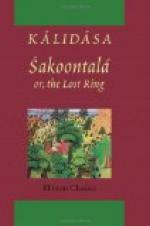119. And with his artless smiles Gladdens their hearts.
Chezy is enraptured with this verse: ’ ... strophe incomparable, que tout pere, ou plutot toute mere, ne pourra lire sans sentir battre son coeur, tant le poete a su y rendre, avec les nuances les plus delicates, l’expression vivante de l’amour maternel.’ Compare Statius, Theb., book v. line 613.
’Heu ubi siderei vultus? ubi verba
ligatis
Imperfecta sonis? risusque et murmura
soli
Intellecta mihi?’
120. It is against propriety to make too minute inquiries about the wife of another man.
The Hindus were very careful to screen their wives from the curiosity of strangers; and their great lawgiver, Manu, enjoined that married women should be cautiously guarded by their husbands in the inner apartments (antahpura) appropriated to women (called by the Muhammadans, Haram, and in common parlance, in India andar-mahall). The chief duty of a married woman’s life seems to have been to keep as quiet as possible, to know as little as possible, to hear, see, and inquire about nothing; and above all, to avoid being herself the subject of conversation or inquiry; in short, the sole end and object of her existence was to act as a good head-servant, yielding to her husband a servile obedience, regulating the affairs of his family, preparing his daily food, and superintending his household. (Manu, ix. 11, 16.) But notwithstanding the social restrictions to which women were subjected, even in the earlier periods of Indian history, it seems probable that they were not rigidly excluded from general society until after the introduction of Muhammadan customs into India. It appears from the plays that they were allowed to go into public on certain occasions; they took part in bridal processions, and were permitted to enter the temples of the gods, [S’]akoontala appears in the court of King Dushyanta and pleads her own cause; and Vasavadatta, in the Ratnavali, holds a conversation with her father’s envoy. Even in later times, the presence of men, other than husbands or sons, in the inner apartments, was far from being prohibited. See Wilson’s Hindu Theatre, p. xliii.
121. Her long hair Twined in a single braid.
Hindu women collect their hair into a single long braid as a sign of mourning, when their husbands are dead or absent for a long period.
122. Shines forth from dim eclipse.
The following is the Hindu notion of an eclipse:—A certain demon, which had the tail of a dragon, was decapitated by Vishnu at the churning of the ocean; but, as he had previously tasted of the Amrit or nectar reproduced at that time, he was thereby rendered immortal, and his head and tail, retaining their separate existence, were transferred to the stellar sphere. The head was called Rahu, and became the cause of eclipses, by endeavouring at various times to swallow the sun and moon. So in the Hitopade[s’]a, line 192, the moon is said to be eaten by Rahu. With regard to the love of the Moon for Rohini, the fourth lunar constellation, see note 53.




